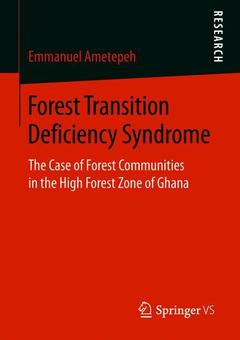Description
Forest Transition Deficiency Syndrome, 1st ed. 2019
The Case of Forest Communities in the High Forest Zone of Ghana
Author: Ametepeh Emmanuel
Language: English
Subject for Forest Transition Deficiency Syndrome:
Publication date: 01-2019
356 p. · 14.8x21 cm · Paperback
356 p. · 14.8x21 cm · Paperback
Description
/li>Contents
/li>Biography
/li>Comment
/li>
While previous studies focus on lack of enforcement of forest laws, poverty, and ecological values of forest dependent people, coherent studies on people?s motivations for forest illegalities and non-compliance behavior remain scanty. Emmanuel Ametepeh argues that the systematic analysis of cause-and-effect patterns related to forest management measures and policies through the lenses of the Forest Transition Theory uncovers severe limitations. The resulting multi-complex stress factors adversely impact and hence manifest in the form of deviant compliance behavior (?syndrome?) in the management endeavor of forest-fringe people. The Author shows that motivations for forest illegalities and associated non-compliance behavior is largely an outcome of adverse experiences forest people have been subjected to as a result of historical and contemporary neglects and marginalization in the management endeavor.
Forest Transition Theory and Pathway Policies.- Globalization Pathway Policies and Institutional Framework.- Domestic Pathway Policies and Institutional Framework.- From Deficiencies to Syndrome: A Case Study of Policies in Practice.- Hybrid Pathways for Ghana – Recommendations.
Emmanuel Ametepeh received his doctoral degree under the supervision of Prof. Dr. Regina Kreide at the Faculty of Social and Cultural Studies at the University of Giessen, Germany.
Publication in the field of climate change policy and forest management
© 2024 LAVOISIER S.A.S.

